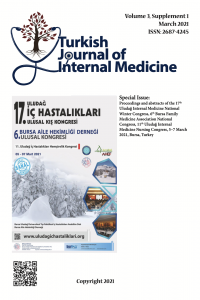Evaluation of Clinical, Genetic and Treatment-Related Characteristics in FMF Patients by Gender Distribution
Abstract
The aim of this study is to investigate the differences between males and females in clinical findings, hereditary characteristics, treatment responses and pathogen Mediterranean fever (MEFV) gene phenotype frequencies in FMF patients. The data of 105 patients (70 females, 35 males) whose charts were available for all research data were evaluated. While evaluating the clinical findings; The age of attack onset, attack character, dominant attack location, presence of recurrent fever, appendectomy history and family history were evaluated. the response to colchicine treatment was questioned. The phenotype frequencies of the pathogen variations in the MEFV gene were determined. The frequency of individuals with typical attack character was 71.4% in women and 82.9% in men. The frequency of the predominant attack localization with peritoneum was 90% in women and 88.6% in men. The proportion of those with colchicine response was 92.8% and 85.7% in women and men, respectively. The phenotype frequencies of pathogen MEFV gene mutations were 62.7% and 88.6% for M694V (p=0.006), 22.4% and 14.3% (p=0.328) for V726A, 20.9% for M680I in women and men, respectively, and 22.9% (p = 0.819) and 14.9% and 14.3% (p=0.931) for E148Q. Clinical findings and treatment responses are not different in individuals with FMF disease. The frequency of the M694Vmutation, which has high penetration and is associated with important complications such as amyloidosis, is higher in men. There is a need for studies to evaluate FMF activity according to gender distribution.
References
- Karadag O, Tufan A, Yazisiz V, Ureten K, Yilmaz S, Cinar M, et al. The factors considered as trigger for the attacks in patients with familial Mediterranean fever. Rheumatology international. 2013;33(4):893-7.
- Kishida D, Nakamura A, Yazaki M, Oka K, Tsuchiya-Suzuki A, Ichikawa T, et al. Triggering factors for febrile attacks in Japanese patients with familial Mediterranean fever. Clinical and experimental rheumatology. 2020;38 Suppl 127(5):76-9.
Abstract
References
- Karadag O, Tufan A, Yazisiz V, Ureten K, Yilmaz S, Cinar M, et al. The factors considered as trigger for the attacks in patients with familial Mediterranean fever. Rheumatology international. 2013;33(4):893-7.
- Kishida D, Nakamura A, Yazaki M, Oka K, Tsuchiya-Suzuki A, Ichikawa T, et al. Triggering factors for febrile attacks in Japanese patients with familial Mediterranean fever. Clinical and experimental rheumatology. 2020;38 Suppl 127(5):76-9.
Details
| Primary Language | English |
|---|---|
| Subjects | Clinical Sciences |
| Journal Section | Short Report |
| Authors | |
| Publication Date | March 7, 2021 |
| Submission Date | February 8, 2021 |
| Acceptance Date | March 4, 2021 |
| Published in Issue | Year 2021 Volume: 3 Issue: Supplement 1 |



